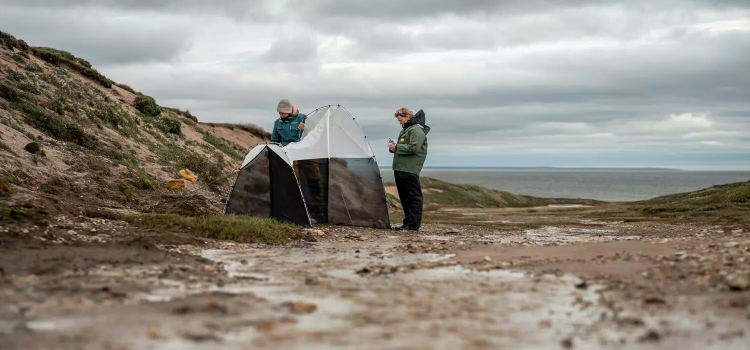The University of Calgary Faculty of Veterinary Medicine's (UCVM) Dr. Susan Kutz D.V.M is leading an expert interdisciplinary team set to revolutionize arctic wildlife conservation with a transformative grant of 2.5 million dollars from the Weston Family Foundation. This innovative project, partnering with communities of the Kitikmeot Region of Nunavut, aims to create a comprehensive wildlife health, insect, and pathogen surveillance network. This network will integrate community-driven monitoring with advanced genomic techniques to provide advanced detection of waning wildlife and ecosystem health.

Trap set up to passively collect flying insects near Cambridge Bay. Photo Credit: Danielle Nowosad
A new era of proactive conservation
The core research question guiding the team's work is: How can we improve timely detection of, and response to, threats and population declines in wildlife to better protect arctic biodiversity?
The population-census methods that have historically been used often lag behind rapid changes in species' status. This project seeks to overcome these limitations by identifying emerging pathogen threats and implementing an integrative, action-oriented health surveillance system. Project collaborator Dr. Amanda Melin shares, "we are excited that the genomic resources and methods we are developing will dramatically improve understanding of host-parasite interactions in the Arctic, and through this the factors shaping the health of the ecosystem."
By focusing on caribou and muskoxen, two critical components of the arctic ecosystem, the project aims to develop a scalable framework applicable to other northern species and regions.
The role of insects that bite
Biting insects, such as mosquitoes and black flies, are highly sensitive to climate change, and recent decades have seen rapid range expansions for many of these insects. Beyond just pests, these species act as a vector for pathogens that pose emerging threats to caribou, muskoxen, and other arctic wildlife. Despite the significance of mosquitoes and black flies, data on their diversity, ranges, and vector-competency in the Arctic are limited. Dr. John Soghigian, PhD, from UCVM, together with Dr. Amanda Melin, PhD and University of Guelph's Dr. Dirk Steinke, will employ genomic surveillance to fill critical knowledge gaps, providing insights that are crucial for effective wildlife management and conservation strategies.
"As the planet warms, we know the distributions of biting insects will change; we are already seeing that around the globe," says Soghigian. "Understanding how this might influence disease transmission in the Arctic requires a baseline of where insect vectors are found, what animals they feed on, and what pathogens they transmit. This project aims to do just that," he continues.
Community-engaged and genomically informed
Central to the project's success is its community-partnered approach. By bringing Indigenous Knowledge together with Western science, the initiative ensures a much richer understanding of the ecosystem and the threats to biodiversity. Community involvement contextualizes the work, enhances local capacity, and ensures that real-time, community-generated data inform timely conservation actions and policies.
Extending outreach to engage Indigenous youth in science
In alignment with the Weston Family Foundation grant, the Kutz Research Group has also just received $379,200 in funding from NSERC PromoScience to continue engaging and inspiring young Indigenous Northerners to develop their skills, curiosity, and potential career visions through science, technology, engineering, and mathematics (STEM). Dr. Kutz's team has worked with the PromoScience program since 2003, and this 2024-27 grant will support their continued and expanded collaboration with local schools, Elders, and Indigenous and government wildlife co-management agencies, to deliver ongoing science outreach in multiple arctic communities. The team's program reaches more than 400 Inuit youth through hands-on classroom and on-the-land activities about wildlife biology, health, and management. It is relevant and intriguing to the youth because young Kutz lab scientists deliver programming while actively researching pressing wildlife and public health issues in communities
A vision for sustainable Arctic biodiversity
Dr. Kutz envisions a future where communities are leaders in wildlife health surveillance, guiding proactive measures in managing species and conserving biodiversity. "By generating ongoing, actionable data, our team aims to support communities and safeguard arctic wildlife in the face of rapid environmental changes," she says.
This initiative exemplifies the University of Calgary's commitment to starting something impactful, where innovative research meets community collaboration to protect our planet's precious biodiversity.









